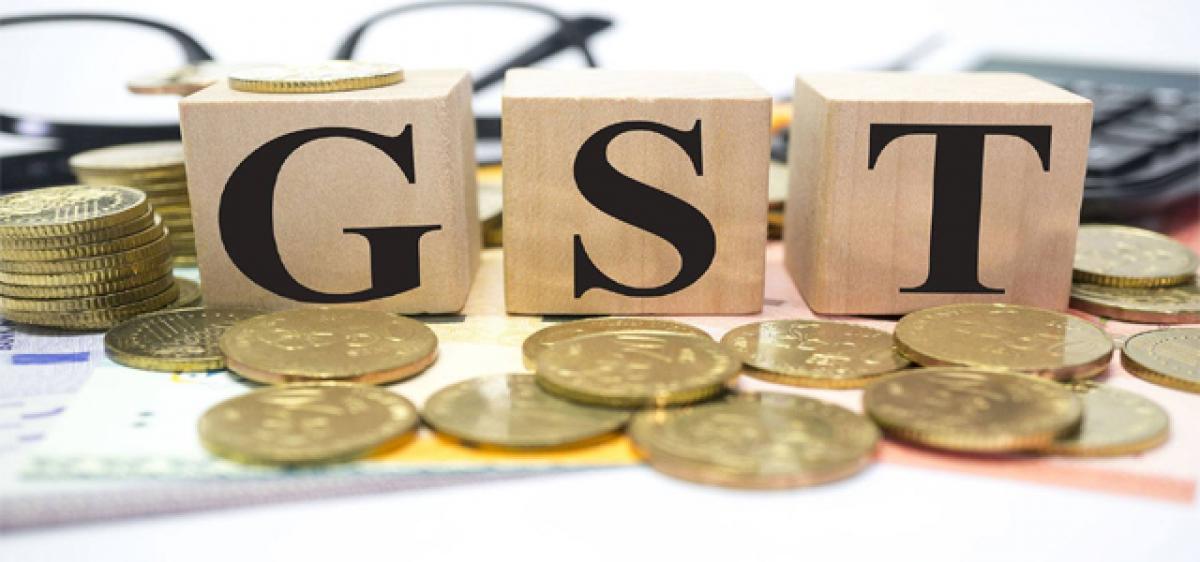Live
- GMR Airports Unveils AI-Powered Digital Twin Platform to Transform Airport Operations
- India poised to become leading maritime player: PM Modi
- Top Causes of Kidney Stones and How to Recognize Silent Symptoms
- India’s renewable energy capacity logs 14.2 pc growth at 213.7 GW
- Winter Session of Odisha Assembly adjourned sine die
- Biden calls Trump's tariff approach 'major mistake'
- After Drama Over Eknath Shinde’s Chief Minister Race, Maharashtra Cabinet Formation Faces New Tensions
- Egyptian FM, Blinken discuss recent developments in Syria
- Iran's supreme leader says Syria's developments result of US-Israeli 'plot'
- Elon Musk to Purchase $100 Million Luxury Mansion Next to Donald Trump's Mar-a-Lago, Report Reveals
Just In

The proposed 4-tier GST structure may hit the common man as it is likely to result in higher taxes on various items, including kitchen staples such as edible oils, spices and chicken.
New Delhi: The proposed 4-tier GST structure may hit the common man as it is likely to result in higher taxes on various items, including kitchen staples such as edible oils, spices and chicken.
The prices of certain consumer durables like televisions, air conditioners, fridges and washing machines may however become cheaper with decrease in taxes.
The government plans to roll out the new indirect tax regime, Goods and Services Tax (GST), from April 1, 2017. In its meeting with states this week, the Centre has proposed a four slab GST rate structure.
All types of edible oils, spices, chicken, turmeric, jeera, dhania, black pepper, oil seeds, gas stove, gas burner, mosquito repellent and insecticide
TV, air-conditioner, washing machines, inverters, refrigerators, electric fans and cooking appliances perfumes, shaving cream, powder, hair oil, shampoo, soap, and other toiletry items
The lowest rate proposed is 6 per cent, with two standard rates of 12 and 18 per cent. The peak rate, which will mostly apply to FMCG and consumer durables, will be 26 per cent. Besides, a cess is also likely to be levied on demerit or sin goods and polluting items.
According to the Centre's estimates on impact of the 4-slab rate structure on CPI inflation, items like chicken and coconut oil which currently suffer a tax incidence of 4 per cent will be taxed at 6 per cent under the GST regime.Similarly, the tax burden on refined oil, mustard oil and groundnut oil will go up from 5 per cent to 6 per cent.
Other kitchen staples too will be taxed at 6 per cent as against 3 per cent in case of turmeric and jeera, 5 per cent in case of dhania, black pepper and oil seeds.
TVs, air conditioners, washing machines, inverters, refrigerators, electric fans and cooking appliances may become cheaper with the incidence of taxes on them declining from 29 per cent to 26 per cent post implementation of the GST.
Perfumes, shaving cream, powder, hair oil, shampoo, soap, and other toiletry items will become cheaper as they too presently are taxed at 29 per cent.
Gas stove, gas burner, mosquito repellent and insecticide may, however, become expensive as they are currently taxed at 25 per cent, lower than the proposed peak rate of 26 per cent under GST.
Under the proposed 4-slab structure, the items which are currently taxed between 3 per cent and 9 per cent will fall in the 6 per cent bracket; those in 9 per cent to 15 per cent range will come under 12 per cent rate.
Those products which are currently taxed between 15 per cent and 21 per cent would attract 18 per cent levy, while those above 21 per cent would be taxed at the peak rate of 26 per cent. The GST Council, which has Union Finance Minister and his state counterparts, will decide on tax rates next month.
Saying that the 4-tier rate structure was designed in a way that neither the exchequer lose revenue nor does the common man's tax liability increase significantly, Finance Minister Arun Jaitley had said: "The effort will be to fit the goods in the closest tax bracket under GST."

© 2024 Hyderabad Media House Limited/The Hans India. All rights reserved. Powered by hocalwire.com







